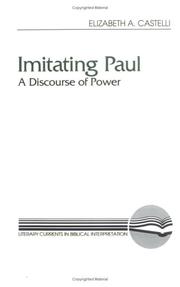| Listing 1 - 9 of 9 |
Sort by
|
Book
ISBN: 9781532637728 9781532637735 9781532637742 Year: 2018 Publisher: Eugene Pickwick Publications
Abstract | Keywords | Export | Availability | Bookmark
 Loading...
Loading...Choose an application
- Reference Manager
- EndNote
- RefWorks (Direct export to RefWorks)
This interdisciplinary study focuses upon two conflicts within early Christianity and demonstrates how these conflicts were radically transformed by the Greco-Roman rhetorical and compositional practice of mimesis—the primary means by which Greco-Roman students were taught to read, write, speak, and analyze literary works. The first conflict is the controversy surrounding Jesus’s relationship with his family (his mother and brothers) and the closely related issue concerning his (alleged) illegitimate birth that is (arguably) evident in the gospel of Mark, and then the author of Matthew’s and the author of Luke’s recasting of this controversy via mimetic rhetorical and compositional strategies. I demonstrate that the author of our canonical Luke knew, vehemently disagreed with, used, and mimetically transformed Matthew’s infancy narrative (Matt 1–2) in crafting his own. The second controversy is the author of Acts’ imitative transformation of the Petrine/Pauline controversy—that, in Acts 7:58—15:30, the author knew, disagreed with, used, and mimetically transformed Gal 1–2 via compositional strategies similar to how he transformed Matthew’s birth narrative, and recast the intense controversy between the two pillars of earliest Christianity, Peter and Paul, into a unity and harmony that, historically, never existed. --
Mimesis in the Bible --- Bible. --- Criticism, interpretation, etc.
Book
ISBN: 9781350057418 135005741X 9781350057425 9781350057449 Year: 2020 Publisher: London Bloomsbury Academic
Abstract | Keywords | Export | Availability | Bookmark
 Loading...
Loading...Choose an application
- Reference Manager
- EndNote
- RefWorks (Direct export to RefWorks)
Central to identity, personal responsibility, economic systems, theology, and the political and military imaginaries, the practice of sacrifice has inspired, disturbed, and abused. Mimesis and Sacrifice brings together scholars from the humanities, military, business, and social sciences to examine the role that sacrifice plays in different present-day settings, from economics to gender relations.Inspired by Rene Girard's work, chapters explore (i) the extent to which the social character of human living makes us mimetic, (ii) whether mimesis necessarily leads to competitive aggression, (iii) whether aggression must be defused by aggressive sacrificial rituals-and whether all sacrifice has this aim, and (iv) the role of the “second lesson of the cross” (as Girard called it), the lesson of self-giving for others, in addressing present societal problems.By investigating sacrifice across this span of arenas and questions yet within one volume, Mimesis and Sacrifice presents a new appreciation of its influence and consequences in the world today, contributing not only to mimetic theory but to greater understanding of which societal arrangement enable us to live well together and what hobbles that goal.
Sacrifice --- Mimesis in the Bible --- Girard, René, --- Girard, René
Book
ISBN: 0773412190 9780773412194 9780773437197 0773437193 Year: 2010 Publisher: Lewiston [N.Y.] Edwin Mellen Press
Abstract | Keywords | Export | Availability | Bookmark
 Loading...
Loading...Choose an application
- Reference Manager
- EndNote
- RefWorks (Direct export to RefWorks)
Mimesis in the Bible. --- Bible. --- Criticism, interpretation, etc.
Book
ISBN: 9781611864649 9781609177416 9781628955057 9781628965001 Year: 2023 Publisher: East Lansing, Michigan Michigan State University Press
Abstract | Keywords | Export | Availability | Bookmark
 Loading...
Loading...Choose an application
- Reference Manager
- EndNote
- RefWorks (Direct export to RefWorks)
"Cowdell shows how Girard's vision of human transformation through faith in Christ reveals a different world beyond ontological violence while preserving the divine participation that Milbank champions"--
Violence --- Mimesis in the Bible --- Metaphysics --- Religious aspects

ISBN: 0664252346 Year: 1991 Publisher: Louisville Westminster/John Knox Press
Abstract | Keywords | Export | Availability | Bookmark
 Loading...
Loading...Choose an application
- Reference Manager
- EndNote
- RefWorks (Direct export to RefWorks)
Mimesis in the Bible --- Power (Social sciences) --- Bible. --- Criticism, interpretation, etc.
Book
ISBN: 3460045213 9783460045217 Year: 1993 Volume: 152 Publisher: Stuttgart: Katholisches Bibelwerk,
Abstract | Keywords | Export | Availability | Bookmark
 Loading...
Loading...Choose an application
- Reference Manager
- EndNote
- RefWorks (Direct export to RefWorks)
Mimesis in the Bible. --- Imitation --- History. --- 226.3 --- -Mimesis in the Bible --- #GGSB: Exegese N.T. --- #GGSB: Synoptici --- #GGSB: Tekstkritiek N.T. --- #GROL:SEMI-22<08> Stut 152 --- Mimicry --- Influence (Psychology) --- Social influence --- Evangelie volgens Marcus --- History --- Mimesis in the Bible --- #GGSB: Exegese N.T --- #GGSB: Tekstkritiek N.T --- Bible. --- Criticism, Narrative. --- Exegese N.T --- Synoptici --- Tekstkritiek N.T --- Imitation - History.

ISBN: 0824516346 Year: 2003 Publisher: New York (N.Y.) Crossroad
Abstract | Keywords | Export | Availability | Bookmark
 Loading...
Loading...Choose an application
- Reference Manager
- EndNote
- RefWorks (Direct export to RefWorks)
Mimesis in literature --- Mimesis in the Bible --- Myth --- Religion and culture --- Sacrifice --- Scapegoat --- Violence --- Religious aspects --- Girard, René, --- Interviews. --- Bible. --- Hermeneutics.
Book
ISBN: 3161540506 9783161540509 Year: 2016 Volume: 356 7 7 Publisher: Tübingen: Mohr Siebeck,
Abstract | Keywords | Export | Availability | Bookmark
 Loading...
Loading...Choose an application
- Reference Manager
- EndNote
- RefWorks (Direct export to RefWorks)
225.08*2 --- Theologie van het Nieuwe Testament: moraal; ethica; juridica Israelis --- 225.08*2 Theologie van het Nieuwe Testament: moraal; ethica; juridica Israelis --- Church history --- Church history. --- Doxology --- Doxology. --- Ethics in the Bible --- Ethics in the Bible. --- Ethiek. --- Language and ethics --- Language and ethics. --- Metaphor in the Bible --- Metaphor in the Bible. --- Mimesis in the Bible --- Mimesis in the Bible. --- Narration in the Bible --- Narration in the Bible. --- Vroege christendom. --- Primitive and early church. --- History --- Bible. --- New Testament --- Criticism, interpretation, etc. --- 30-600.
Book
ISBN: 9780567437204 0567437205 9780567225702 9780567678416 Year: 2017 Volume: 498 Publisher: New York: Bloomsbury,
Abstract | Keywords | Export | Availability | Bookmark
 Loading...
Loading...Choose an application
- Reference Manager
- EndNote
- RefWorks (Direct export to RefWorks)
Mimesis is a fundamental and pervasive human concept, but has attracted little attention from Johannine scholarship. This is unsurprising, since Johannine ethics, of which mimesis is a part, has only recently become a fruitful area of research. Bennema contends that scholars have not yet identified the centre of Johannine ethics, admittedly due to the fact that mimesis is not immediately evident in the Johannine text because the usual terminology for mimesis is missing. This volume is the first organized study on the concept of mimesis in the Johannine literature. The aim of the study is to establish that mimesis is a genuine Johannine concept, to explain its particulars and to show that mimesis is integral to Johannine ethics. Bennema argues that Johannine mimesis is a cognitive, creative process that shapes the believer's identity and behaviour within the context of the divine family. Besides being instrumental in people's moral transformation, mimesis is also a vital mechanism for mediating the divine reality to people.
Mimesis in the Bible. --- Ethics --- Ethics in the Bible. --- Biblical teaching. --- Bible. --- Criticism, interpretation, etc. --- Mimesis in the Bible --- Ethics in the Bible --- 226.5 --- 226.5 Evangelie volgens Johannes --- 226.5 Evangile de S. Jean --- Evangelie volgens Johannes --- Evangile de S. Jean --- Biblical ethics --- Biblical teaching --- Epistles of John (Books of the New Testament) --- Johannine Epistles --- John, Epistles of --- Letters of John (Books of the New Testament) --- Jean (Book of the New Testament) --- Johanisi (Book of the New Testament) --- Johannesevangelium --- John (Book of the New Testament) --- Yohan pogŭm --- Yohane den (Book of the New Testament) --- Yūḥannā (Book of the New Testament) --- Bible --- Criticism, interpretation, etc --- Ioganaĭ (Book of the New Testament) --- Иоганай (Book of the New Testament) --- Ethics - Biblical teaching.
| Listing 1 - 9 of 9 |
Sort by
|

 Search
Search Feedback
Feedback About UniCat
About UniCat  Help
Help News
News